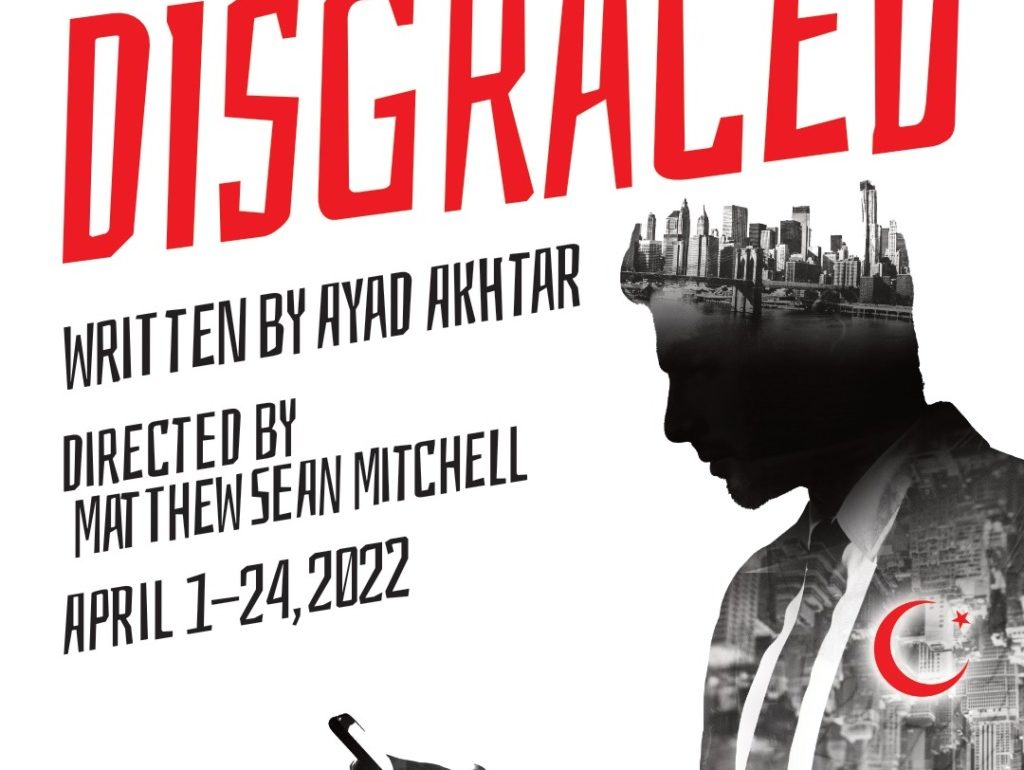Order or justice? Henry Kissinger made a quote about it. That quote gets referenced by one of the characters in Ayad Akhtar’s volatile and evocative drama, Disgraced, which is now on stage at the Vagabond Players in Fells Point. Directed by Matthew Sean Mitchell, this 90-minute intense drama takes place inside one apartment on New York’s Upper East Side during the summer and fall of 2011, one decade after the terrorist attack on September 11th. Drawing light on racial tensions and disparities in ancient cultures and the way they are perceived in modern day art, Akhtar’s work is one of intense emotional depth and the production at Vagabond Players is delivered with stunning sincerity.

Director and Set Designer Matthew Sean Mitchell presents a rather posh set for the play, immediately giving the illusion of upper-class living. The apartment interior is sophisticated and functional, the type of space one hosts parties in or entertains in but does not actually live in. Mitchell captures that ‘too-curated’ feel of what high-powered, wealthy individuals— one lawyer, one artist— existing in Manhattan live like. It’s cold and unfeeling and cluttered with their artistic artifacts that are trying to desperately reflect their education and interests. The walls are even painted that slate gray, the same color of a recently flipped house, implying that they’re so busy with their soulless lives that they couldn’t be bothered to repaint. Costumer Laura Buccigrossi and Lighting Designer Adrienne Cassara both deserve a nod for their additions to the overall production values, with Buccigrossi’s sartorial selections for the show being spot on to these character’s personality types and Cassara’s illuminating tactics creating a visceral final moment in the play.
As the show’s director, Mitchell manages to create a deeply moving series of events that unfold on the stage. At first the pacing feels somewhat stifled, the scenes— despite their truncated length for the first two— feel somewhat sluggish and this falls partially on the way that Ayad Akhtar has written the initial build-up and partially on Mitchell’s pacing. But this need for tighter dialogue exchanges and an overall push in the pacing in the first two scenes is readily forgiven when the metaphorical ‘it’ hits the fan in the third scene. When the tempers flare and bomb goes off— such chaos and raw, unadulterated passion is flying with such intensity all around that stage that you nearly forget and most certainly forgive the slow start to the show.
While existing as a transient outlier in the narrative, the character of Abe (Danny Sheikh) becomes increasingly reflective of the ever-shifting internal turmoil that the Amir character experiences. At times it is difficult to hear what specifically Sheikh’s character is saying because the enthusiasm or passion with which he is delivering his dialogue is so intense that it overcomes his articulation, but the raw emotions are there, making the overarching intent of his character’s experience clear.
The dynamic interplay of the two married couples is the charge that sets the third scene to rights and ultimately explodes the performance wide open. Director Matthew Sean Mitchell has brilliantly fabricated these moments of ‘heightened levels’ among this quartet of performers. There is a picturesque moment when they all raise their glass in a toast and for one fleeting second, Mitchell has managed to convince the audience that they might all just get along and escape the evening unscathed. Capturing that notion in a singular moment is an impressive feat. The way he rapidly swings the group dynamic— midway through scene three— from slightly prickly to walking on eggshells to picking their way through a minefield is stunning.
Emily (Laura Malkus) and Amir (Nathan Suberi), Jory (Rakael Howard) and Isaac (Mike Byrne) undertake the very difficult task of delivering some of these cringeworthy scenes, with brutal racial slurs and inappropriate comments designed to cut one another down and they do so in this glamorously stunning manner that is astonishingly reminiscent of a trainwreck— in the sense that it’s horrifying but you cannot look away. The play itself revolves around racial stereotypes and profiling, the differentiation of race and religion, as well as the dynamic that comes into play within these groups, disassociation from a religion or a cultural identity, cultural appropriation, and how one’s identity is fitted into those groups or restricted from them. Ayad Akhtar brings heavy topics to the table and the quartet of Malkus, Suberi, Howard, and Byrne unpack them, albeit disruptively and explosively, with such rigor and potency— it’s stunning.

Laura Malkus, as Emily, makes it difficult for her character to really hit a peak because she starts the performance jittering with an external energy and volume that’s pretty heightened, which doesn’t give her much upward space to expand into when the situations draw to more intense severity. But there are moments— particularly with the Amir character at the end of the third scene and with the Isaac character about two thirds of the way through that same scene— that are just harrowing to watch and Malkus does an extraordinary job of delivering them. Her character is the majority of the minorities in this play— the white woman. (Of the main quartet there is Emily the white, non-religious identifying woman, Jory the black, non-religious identifying woman, Amir, the brown no-longer-identifying as Muslim man, and Isaac, the white potentially lapsed-Jewish man.) The way Malkus delivers some of her lines, particularly at the dinner table during the third scene, you can feel that powder keg roaring beneath the surface just waiting to rip, which is an impressive feat considering how heightened her earlier deliveries in the first two scenes are.
Rakeal Howard, as Jory, brings a much-needed series of punchy laughs to some of the more dense moments in this production. There is a fiery spirit about her character from the moment Howard walks onto the set. A lot of the laughter is derived from the somewhat playful, albeit backhanded, tit-for-tat commentary shared between the Jory character and her husband Isaac about her cooking capabilities or lack thereof. Howard delivers sass and ruthlessness in equal parts depending on the dialogue and character interactions. When it comes to facing off with the Amir character in that horrific moment of slur-slinging-showdown, she is a pillar of strength, absorbing his reaction, refusing to stoop to that level, and calmly carrying her character with grace and dignity out of the scene.
A bit too charismatic in a way that instantly puts one guard, Mike Byrne, as the edgy art-show-curator Isaac, finds ways to simultaneously get under your skin and ingratiate himself to you. It’s unnerving and very good acting. There’s a vocal affectation that Byrne is creating for this character that keeps you guessing. It’s not quite New York, it’s not quite Jewish, and it’s not midwestern (as described in his character’s very brief and self-delivered ‘origin story’) but it helps create this natural unease about Isaac, which makes the audience readily willing to turn on him when certain other details about his involvements are revealed.
Nathan Suberi, as Amir is equally enigmatic and multi-layered in a similar vein. Suberi has a great many moments on stage where the things coming out of his character’s mouth are so abhorrent and appalling to civilized ears it’s jaw-dropping to see how smoothly and readily he delivers them; a true mark of a well-versed actor. In the final moments of the play, without explaining what is happening to avoid spoiling, Suberi is alone on stage and the emotion he expresses, without words, is sensational. There is so much packed into one simple look and gesture as the play draws to a close and it really does bring the weight of the play crashing down in that moment.
Disgraced is likely not for the faint of heart as it does include brief moments of physical violence against women, which can be triggering for some. It also includes the use of extremely rude language, racial slurs, and situational conversations devolve quickly into uncivilized fighting. The performers are very impressive and if one can stomach this powerful, evocative, and moving sort of work, Disgraced at Vagabond Players is a powder-keg of relevancy for today’s society.
Running Time: Approximately 85 minutes with no intermission
Disgraced plays through April 24, 2022 at Vagabond Players— located in the heart of Fells Point: 806 S. Broadway in Baltimore, MD. For more information on tickets, seating and Covid policies, please call the box office at (410) 563-9135. Tickets are available for purchase in advance online.

